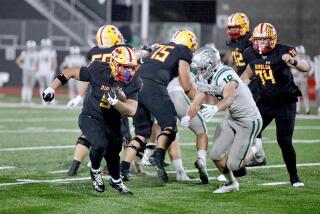Tulsa, a Second Fiddle, Plays a Winning Tune
- Share via
Tulsa in the Freedom Bowl?
What, Southwestern Louisiana wasn’t available?
What in the world is the Freedom Bowl coming to?
It was a peculiar line of questioning, considering that the Freedom Bowl, in its first seven incarnations, hadn’t been much of anywhere. The Freedom Bowl aspires to be Rose Bowl Jr., but to this point, it remains stuck on Holiday Bowl Jr. It’s a mid-sized bowl, now with a touch of history, but in the bowl business, you generally get what you pay for and the Freedom Bowl, handicapped by the lack of a title corporate sponsor, can pay but a relatively modest $650,000 per participant.
Since when did the Freedom Bowl get too big for the Tulsas of the world?
The thing is, the Freedom Bowl never felt that way. When Stanford pulled a Bill Parcells on Anaheim, the Freedom Bowl was still juggling Pittsburgh, North Carolina and a few other readily recognizable names for the vacant slot opposite San Diego State. The Freedom Bowl opted instead for Tulsa, and all the invariable one-liners to follow, because, as Don Andersen, the game’s executive director, said, “We wanted a team that was excited to be here.”
Monday night, Tulsa showed up at Anaheim Stadium for the eighth Freedom Bowl.
Somewhat surprisingly, so did 34,217 spectators.
Somewhat more surprisingly, Tulsa won, 28-17, and did so without its 1,300-yard tailback, Chris Hughley, who had been benched by Coach Dave Rader for fumbling his report card. His replacement, Ron Jackson, was given carte blanche and he responded with Freedom Bowl records in touchdowns (four) and carries (46) and a near Freedom Bowl record in net yardage (211). Only Gaston Green, whose 266 yards led UCLA to victory in Freedom III, ran for more.
That made it a theme night at the Big A. The team that was the second choice wins because of the tailback who was a second choice.
And for the second year in a row, the small-town team returns from Anaheim having made big-time news. In 1990, Fort Collins, Colo. was represented here, and never finer--Colorado State outlasting Oregon in a 32-31 thriller.
Monday, it was Tulsa’s time.
By Tuesday morning, a much larger portion of the country had an idea what a Golden Hurricane was.
“What a privilege it was to be here,” said Rader, an excitable boy masquerading as Tulsa’s head football coach. “Hopefully, we represented our school and our community well here. Ask us back. We’d love to come back.”
Tulsa played, well, Tulsa football. For the uneducated, and there were millions out there prior to kickoff, that means a tailback-heavy offensive game plan, well-spaced short passes--most of them to a wide receiver named Chris Penn--and a knack for making fewer mistakes than the other guy.
San Diego State Coach Al Luginbill said Tulsa played a “flawless football game,” an assessment that was something less. The Golden Hurricane fumbled away one touchdown, with flanker-back Marlo Fair dropping the ball at the Aztec two-yard line midway through the third quarter.
But, that, essentially, was it. And the turnover had been negated one quarter earlier when San Diego State’s Wayne Pittman fumbled away a similar chance, dribbling the ball into the Tulsa end zone, where Hurricane safety Dennis Hickey recovered.
A fumble for a fumble . . . and then Tulsa awaited the next Aztec breakdown. It came on a Tulsa punt. For most of Monday night, this was not a problem for San Diego State, with Gus Frerotte kicking as if he were caught inside a hurricane.
“He has been known to shank ‘em,” Rader acknowledged. So when Frerotte pumped one 54 yards late in the fourth quarter, imagine the surprise on both sidelines--and, especially, the face of San Diego State return man T.C. Wright.
Wright drifted back . . . and back . . . and back some more. The ball kept carrying. At the last instant, he reached up and, committing a grave mistake, he grazed the ball.
A split second later, Tulsans were bounding and abounding all around Wright, with one eventually falling on the loose ball at the Aztec four.
Two plays later, Jackson sprinted over left tackle for touchdown No. 4 and the game was out of reach, 28-17.
“That was uncharacteristic of him,” Luginbill surmised, alluding to Frerotte. “He boomed a punt. It caught us off-guard.”
And so it was for Tulsa on this night. It caught San Diego State, the Freedom Bowl and any semi-interested viewer off-guard.
How does it feel, Golden Hurricane?
“If I were a mountain climber,” said quarterback T.J. Rubley, “I’d say I just reached the tree line. We’ll reach the summit in 10 years when I go back to campus and guys are wearing rings on their left hand. This is what it’s all about.”
Next, the fallout.
Rader anticipates an immediate boost in recruiting. “The national exposure, what can you say?” he said. “Hopefully, we’ve influenced a good many student-athletes to come to the University of Tulsa.”
Rubley anticipates a better television schedule. “I look forward to seeing Tulsa on television on ABC,” he said, “either before or after a Notre Dame game. I’ll be wearing my letterman’s jacket in the summer now.”
As for the moment at hand, Tulsa players could scarcely keep their emotions in hand. They cried, they laughed, they screamed, they hugged. The Freedom Bowl had taken a risk on them and the payback was more than either side could have expected.
“Man,” said Tulsa defensive back Willie Hill as he walked off the field, “do we have to go home?”
More to Read
Go beyond the scoreboard
Get the latest on L.A.'s teams in the daily Sports Report newsletter.
You may occasionally receive promotional content from the Los Angeles Times.










